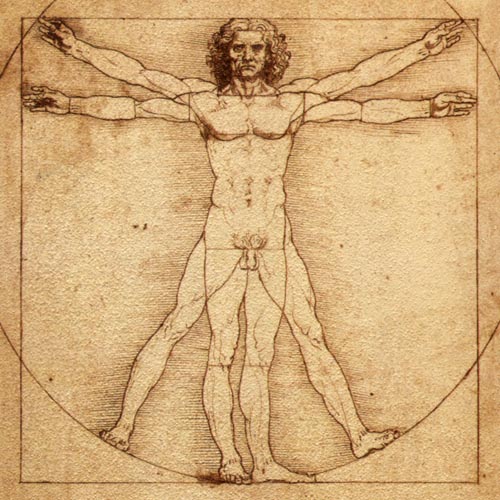
by Casey Sloan
We rely on images of the human body in advertising, in art, in visual arguments, and, quite simply, in navigating everyday social life. Over the years, many philosophers and theorists have grappled with questions like: What constitutes the body? Can the body think? How is the body produced? Why are some bodies more socially acceptable or desirable than others?
In the 1600s, the French philosopher René Descartes' theory of dualism posited that the individual was composed of two distinct substances. The mind, the core of the individual, was immaterial. The body, on the other hand, was unthinking matter, an extension of the mind. Descartes' dualism clearly emphasized the importance of the mind as the lofty seat of human rationality. The body was little more than its physical seat. The self could be neatly separated from material being; the ideal individual was ethereal. This philosophical hierarchy bolstered social and political hierarchies, as well. Women and racial minorities, for example, were often associated with bodily or carnal existence while a select group of men considered themselves bearers of higher thought processes, intellect and rationality.
Sigmund Freud's theories of psychoanalysis, on the other hand, focused attention on an essentialized, natural body as the source of individual identity. Freud argued that all individuals developed mentally according to certain erotic instincts or drives. He famously claimed that culture itself comes from siphoning sexual impulses into socially productive channels. Freud's theories emphasize that an individual's natural sex determines which developmental road his/her mind will set out upon. These narratives of development clearly privilege one sex, basically equating being male with power and being female with submission.
Theorists since Freud have questioned his understanding of the body as essential, or inherent and natural. Michel Foucault's theories of biopolitics suggest that bodies in modern society are sculpted by social processes. Cultural ways of understanding the body (through sciences like biology) and social practices of discipline (through regulatory regimes like mandatory school attendance) inscribe the body with discursive meaning. For Foucault, bodies do not have any essential attributes. Contra Freud, Foucault argues that “bodies” (or an understanding of bodies as possessing natural, pre-cultural qualities) comes from society, not that society comes from natural impulses in bodies.
Feminist theorists have made use of Foucault's understanding of bodies as determined by culture. Judith Butler, for example, argues that “sexed” bodies are not naturally occurring, but are rather constructed by repetitive performances that communicate gender. Her theories of performativity posit that the body is always in the process of becoming, always in the process of being created. An individual body is never in a static state of being, never simply “male” or “female.”
Understanding that “the body” has been theorized in a variety of ways by a variety of thinkers keeps us from making automatic assumptions when the human form appears in visual rhetoric. We should always ask: what claim does this particular representation make about the body? Does this body have a clear or “natural” sex? A clear or “natural” race? What relationship does this body have to the self? Why does this representation want or even need to make this sort of claim?
Works Cited and Related Sources (by publication date)
Descartes, René. Meditations on First Philosophy (1641)
Freud, Sigmund. Civilization and Its Discontents (1930)
Foucault, Michel. Discipline and Punish (1975)
Kristeva, Julia. Powers of Horror: An Essay on Abjection (1982)
Butler, Judith. Bodies that Matter (1993)
Grosz, Elizabeth. Space, Time and Perversion: Essays on the Politics of Bodies(1995)
Penney, Joel. “Visible Identities, Visual Rhetoric: The Self-Labeled Body as a Popular Platform for Political Persuasion” (2012)
Recent comments
2 years 29 weeks ago
2 years 44 weeks ago
2 years 44 weeks ago
2 years 50 weeks ago
3 years 4 weeks ago
3 years 4 weeks ago
3 years 4 weeks ago
3 years 6 weeks ago
3 years 6 weeks ago
3 years 6 weeks ago